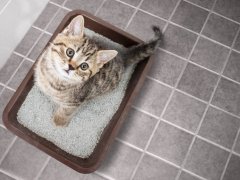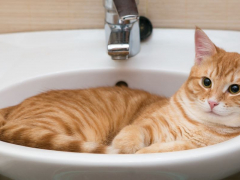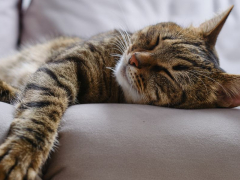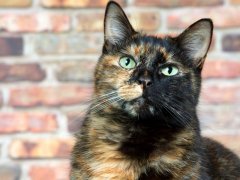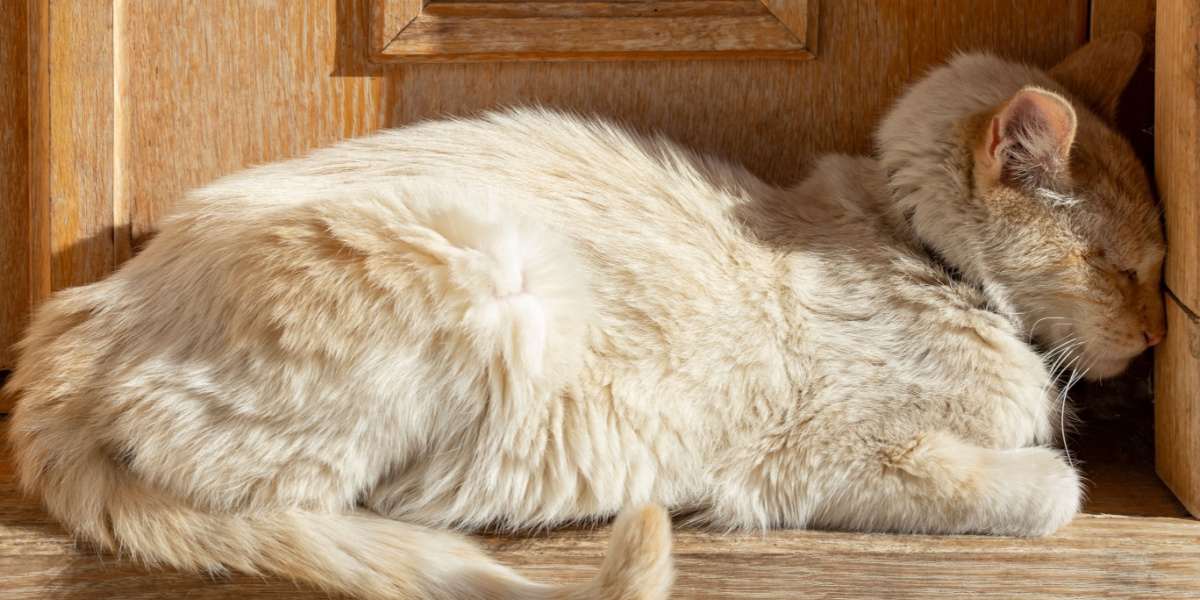
Cats display quirky and amusing behaviors that leave us puzzled. A feline may head press or bump against us to communicate reassurance friendliness and deposit scent. Yet it is abnormal when your cat presses its head against walls or inanimate objects for no apparent reason.
This article discusses possible causes of cat head pressing and how you should respond when their feline compulsively pushes their head on objects.
What Is Cat Head Pressing?
Head pressing is distinctively different from “head butting or bunting.” When a cat head butts you with short head bumps, they are displaying affection. As they rub their heads on people or objects, they deposit pheromones.
A cat who presses the top of its head into a wall or furniture or pushes its face into a corner for an extended period is exhibiting head pressing. The cat is trying to relieve head pain or pressure.
You may also observe your cat move and head press along the entire wall until it gets stuck in the corner with its head compressed against the surface. It’s unpleasant and distressing for your cat since it can’t help but perform this compulsive behavior.
Symptoms of Cat Head Pressing
Sudden blunt head pressing is the first sign of a severe problem in your pet’s central nervous system.
Additional symptoms can accompany head pressing, such as:
- Obsessive pacing and circling
- Unusual vocalization
- Drooling
- Ataxia (loss of balance and coordination)
- Seizures
- Visual impairment
- Damaged reflexes
- Behavioral changes
Possible Causes of Cat Head Pressing
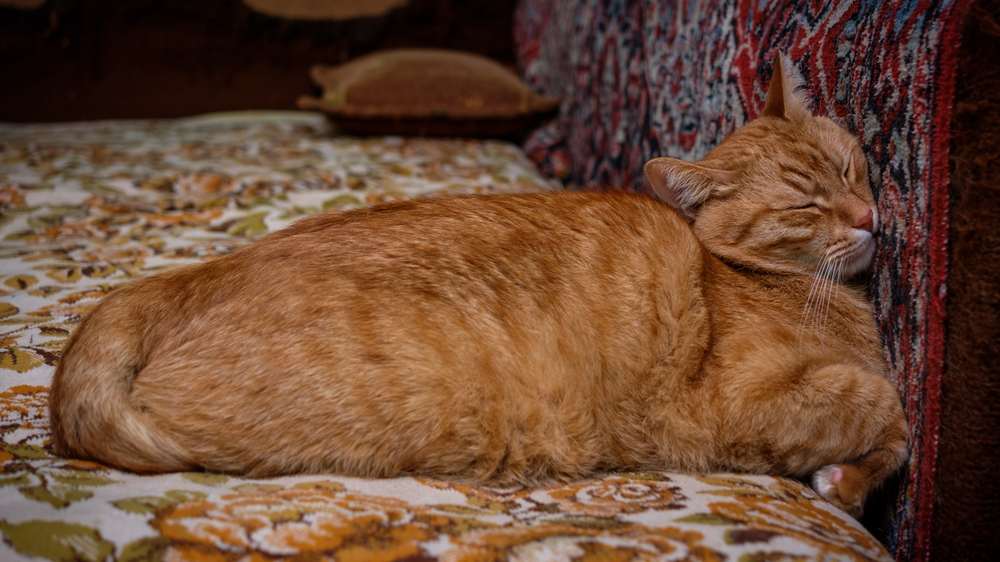
Several medical conditions, head injury, and toxicity can cause head pressing in cats.
Prosencephalon Disease
This illness affects the prosencephalon, also called the forebrain. The forebrain is the front part of the brain and consists of the thalamus, cerebrum, and hypothalamus. The prosencephalon regulates normal functions like eating, sleeping, and stimuli response.
Prosencephalon disease causes abnormalities in brain function. It can manifest as head pressing, circling, seizures, and other neurological signs.
Liver Disorders
The liver is the largest internal organ in the body. Its function is to aid digestion, eliminate toxins, regulate hormones, and more. When the liver isn’t functioning or filtering waste products from the blood correctly, it causes blood to be redirected past the liver into the circulation system—bypassing the detoxification in a process known as Portosystemic shunt (PSS).
Hepatic encephalopathy is a neurological disorder resulting from liver dysfunction and PSS. Affected felines usually display drooling, tremors, pacing, and head pressing along walls.
Poisoning
Due to a cat’s curious nature and grooming habits, poisoning isn’t uncommon. Felines can ingest contaminants by eating poisoned prey or toxic plants. They may also consume harmful substances like bleach, chocolate, or antifreeze, causing major health issues.
Although lead poisoning is rare in cats, consumption of lead paint, grease, or car batteries can cause neurological impairment.
Many contagions produce gastrointestinal symptoms, while others produce neurological signs. Head pressing, incoordination, and tremors are the most common neural indicators of toxicity.
Viral and Infectious Diseases
Viral diseases like Feline Infectious Peritonitis (FIP), Feline Leukaemia Virus (FeLV), or rabies can cause head pressing in cats. Meningitis (inflammation of the membranes covering the brain and spinal cord) and Encephalitis (brain inflammation) can produce head pressing, loss of balance, seizures, and circling behavior. Fungal, parasitic, or bacterial infections can also trigger cat head pressing.
Nervous System Diseases and Injuries
Several neurological disorders can cause head pressing in cats. Although feline brain tumors are rare, they can impact your pet’s life. A growth within the brain can either be cancerous or benign. The most evident sign of brain cancer includes changes in learned behaviors, touch sensitivity on the neck, head pressing, and stumbling into objects due to vision problems.
A spinal cord or head injury from a road traffic accident can also affect cats. As a result, cats can display head pressing, develop ataxia, and become paralyzed.
While strokes caused by blocked arteries or high blood pressure are uncommon in pets, a stroke can cause your cat to head press against a wall and lose essential balance and sight function.
When To Take Your Cat to the Vet?
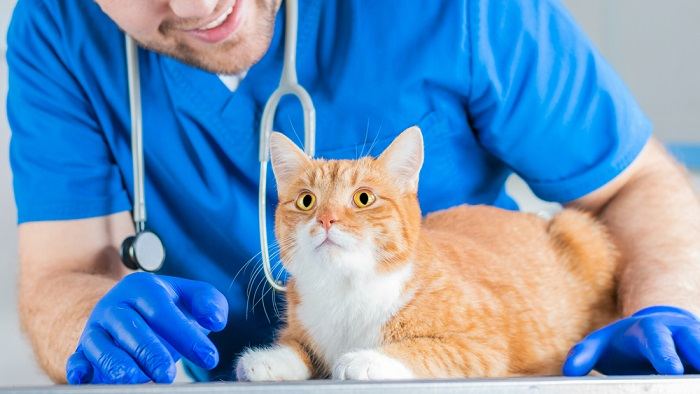
Head pressing is atypical and requires prompt veterinary attention. If you believe your cat is head pressing, bring them to a veterinarian as soon as you can. If possible, record a video of this unusual behavior to show them.
Diagnoses of Cat Head Pressing
There are many potential underlying causes of a cat head pressing, so diagnosing it can be challenging.
Your veterinarian will obtain a complete medical and behavioral history and perform various tests and procedures. They will conduct an extensive eye examination of the retina (the back part of the eye) to check for abnormalities, inflammation, or infectious diseases in the brain.
Your vet will also conduct a blood pressure test to check for elevation. They may also recommend bloodwork and urinalysis to determine whether the cause is due to toxicity or metabolic disorders.
Tests, such as a Computed Tomography Scan (CT) or Magnetic resonance imaging (MRI), may uncover brain illnesses.
Treatment of Cat Head Pressing
Treatment of cat head pressing will vary depending on the precise diagnosis of the underlying cause of each feline patient.
Some underlying conditions involve medical management, while others need surgery and hospitalization. For instance, brain tumor removal will relieve the pressure inside the cat’s head, whilst induction of vomiting in the early stages will treat intoxication.
Your vet will refer you to an animal neurologist for complex neurological illnesses.
The most crucial thing to remember is that cat head pressing is atypical and requires prompt therapy.
Frequently Asked Questions
Is cat head pressing normal?
Head pressing is abnormal in a healthy cat. Head pressing is a compulsive behavior indicating a severe neurological problem that warrants immediate veterinary intervention.
Why do cats press their head against a wall?
Cats may press against a wall for a variety of health conditions. Head pressing is usually a sign of a neurological illness that requires swift veterinary attention.
Why does my cat press their head against mine?
Your cat expresses their love and affection toward you. They also mark you with their scent. Domestic cats are intelligent creatures—they seek your attention through purring and head butting.
How to prevent head pressing in cats?
Keep your cat indoors to prevent injury or head trauma from road traffic accidents or ingesting toxic substances. Vaccinate your cat against infectious diseases like FIV, FeLV, and rabies.
-
Association, A. A. (2022). How can I tell if my pet has had a stroke? Retrieved August 26, 2023, from AAHA: https://www.aaha.org/your-pet/pet-owner-education/ask-aaha/strokes-in-dogs/
-
Blakley, B. R. (2022, November). Lead Poisoning in Animals. Saskatchewan, Canada: MSD Veterinary Manual. Retrieved August 20, 2023, from https://www.msdvetmanual.com/toxicology/lead-poisoning/lead-poisoning-in-animals
-
Care, I. C. (2018, July 30). Cats and poisons. Retrieved August 24, 2023, from Icatcare: https://icatcare.org/advice/cats-and-poisons/
-
Fields, A. C. (2014 and 2019). Neonatal Neurology. Science Direct. Retrieved August 20, 2023, from https://www.sciencedirect.com/topics/veterinary-science-and-veterinary-medicine/prosencephalon
-
Long, M. T. (2022, October). Meningitis and Encephalitis in Cats. Florida, USA: MSD Veterinary Manual. Retrieved August 27, 2023, from https://www.msdvetmanual.com/cat-owners/brain,-spinal-cord,-and-nerve-disorders-of-cats/meningitis-and-encephalitis-in-cats
-
Lu, D. (2015). Metabolic Causes in Feline Neurologic Diseases. Mongkok, Hong Kong. Retrieved August 22, 2023, from https://www.vin.com/apputil/content/defaultadv1.aspx?pId=14365&id=7259259&print=1
-
Schatzberg, S. J. (2009, May 15). Disorders of the Brain. (R. V. Morgan, Ed.) Elsevier, 233–255. Retrieved August 21, 2023, from https://www.ncbi.nlm.nih.gov/pmc/articles/PMC7152123/
-
Schubert, T. (2022, October). Nervous System Disorders and Effects of Injuries in Cats. (C. o. Small Animal Clinical Sciences, Compiler) Florida, USA: MSD Veterinary Manual. Retrieved August 24, 2023, from https://www.msdvetmanual.com/cat-owners/brain,-spinal-cord,-and-nerve-disorders-of-cats/nervous-system-disorders-and-effects-of-injuries-in-cats
-
Torisu, S. (2011). Hepatic Encephalopathy in Dogs and Cats. (U. o. Laboratory of Teaching Hospital Faculty of Agriculture, Compiler) Miyazaki, Japan: World Small Animal Veterinary Association World Congress Proceedings. Retrieved August 27, 2023, from https://www.vin.com/apputil/content/defaultadv1.aspx?pId=11343&meta=generic&catId=34569&id=5124403&ind=150&objTypeID=17



